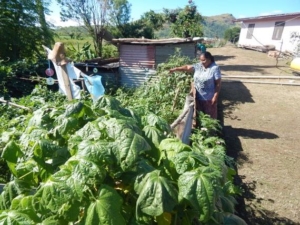Passionate Youth Entrepreneurs Drive Fiji’s Sustainable Food Shifts

Fiji, a large archipelago in the South Pacific, has diverse landscapes and climate. Although a nation of complex ecosystems, the island’s food systems suffer to feed its own sustainably. The leading cause of death in Fiji is NCDs, a rising crisis affecting thousands. Furthermore, malnourishment afflicts more than 40% of Fijian children, “a condition caused when children (and adults) don’t eat enough food, don’t eat the right sort of food, or are unable to digest food.” The health of Fijians is at risk as the history of chronic mistreatment of the body stresses the demand for sustainable food systems to cure the nation’s health behaviors. In response, youth-led social entrepreneurship and innovation efforts aim to advocate for Fiji’s sustainable food shifts that promote positive human health needs.
The participation of the country’s passionate youth emerges in their drive to endorse and build sustainable approaches to deliver fresh, nutritional foods to local communities. Pulling from several studies and journals, the island parents established several programs and initiatives to champion Fiji’s youth to combat NCDs.
Poverty and Food in Fiji
Fiji, a Pacific nation scattered across 300 islands, flourishes with substantial natural resources and accessibility to rich freshwater resources and fertile land to grow crops. However, due to the country’s remote location, Fiji battles with changing weather patterns and disasters that continue to threaten communities and limit Fijians to fresh local foods (fruits, vegetables, fish, etc.).
Despite Fiji’s larger geographic size and favorable growing conditions, “High consumption of energy-dense foods is also considered a contributing factor to the increasing prevalence of non-communicable diseases (NCDs) in Fiji..” According to importation data, Fiji’s reliance is low at 22.46%, while exporting figures rest at 60.02%. Although these statistics materialize deceptions that food is accessible, 30% of Fijians live below the basic needs poverty line. This marks 14% of the population as experiencing moderate to severe levels of food insecurity.
Due to the island’s extreme sensitivity to disastrous natural disasters, higher food prices, seasonality and lifestyle choices, the stability of Fiji’s food system worsens, putting Fijian health at risk.
Pacific Youth Leadership
The message of healthy and sustainable foods and the ability to create them is the information that the young community of Fiji (which makes up more than half the population) needs to learn. Luckily, many people are starting to see these issues and are passionate about animating Fiji’s sustainable food shifts. The Participatory Action Research (PAR) of Talanoa is one example of a group excited to help make a difference in food systems. It is passionate about spreading the word about new ideas to young people to help build the future leaders of these big projects. Alongside this work, it aims to bring back the traditions of Fijian food, rooted in fish, vegetables and other nutritious foods.
Another group, the Young Entrepreneurs Council, is focused on changing the narrative around food in general. Taking a more psychological approach to the situation and working on education around the relationship between the body and food, rather than only explaining what food is bad for you, a tactic that has proven unsuccessful. Teaching people to love food and understand what healthy food is capable of can have groundbreaking results as opposed to previous methods, which can do the opposite.
In addition, the 2022-2027 Youth in Agriculture Policy notes young people as crucial agents for positive change, increasing its support in the 2023-2024 budget, supporting the “establishment of sustainable gardens for young people’s health and wellbeing.”
The Minister explains, “Under this policy, young people will be encouraged and supported through a 4-pronged approach of increasing access to land, finance and markets; improving agricultural education and training; increasing commercial agriculture opportunities and supporting sustainability.” Furthermore, the SDG Fund program, led by UNDP and in partnership with IFAD, envisions young people with employment opportunities in the agriculture sector. These initiatives strengthen public-private partnerships, meeting the needs of education and employment for Fiji’s youth within the agricultural sector, empowering self-sufficiency and local production of healthy food to advocate for resilient food systems.
Fiji’s Future
Overall, the hope is to bring down the rates of non-communicable diseases like diabetes, obesity and heart disease that have hurt the nation. Creating enough food sources locally to provide for the community is vital in bringing these numbers down and decreasing poverty significantly.
There is great hope that in the future, the children of Fiji will feast on the local fish, fruits and veggies that become so available on the island that the history of health issues is long in the past, but change must start now to invigorate Fiji’s sustainable food shifts. The Ministry sums up the integral participation of young Fijians, “We can create livelihoods without sacrificing our biodiversity. Rather than leave our children a world of lifeless deserts, we can pass on ecosystems that are rich with life and capable of supporting coming generations.”
– Emmalyn Meyer
Photo: Flickr
